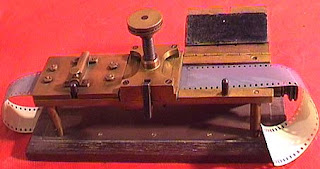 Definition: "Film editing is part of the post-production process of filmmaking. It involves the selection and combining of shots, connecting the resulting sequences, and ultimately creating a finished motion picture. It is an art of storytelling."
Definition: "Film editing is part of the post-production process of filmmaking. It involves the selection and combining of shots, connecting the resulting sequences, and ultimately creating a finished motion picture. It is an art of storytelling."Editing establishes the mood of the film. The most skilled editors are rhythmic in their pacing and deliberate in their cutting. Successful directors have an editor on staff that they trust with their livelyhood. This means, the director gives the editor the film that they have worked on for 18 months and walk away. Filmmakers tend to loose sight of their original vision when they spend so much time with a story. A healthy practice is to give the story a new set of eyes. Francis Ford Coppola has Walter Murch. Martin Scorsese has Thelma Schoonmaker. Alfred Hitchcock had George Tomasini.
I tried to find editing reels for your visual education. After much research, I resigned to the fact that watching a well edited scene is more powerful than a rushed reel.
Below are some links that will kick-start your research. Click on the titles for the links.
Cinema Editing Terms: This site has a simplistic design that helps the viewer locate terms quickly.
WNYC Radiolab Interview with Walter Murch: Great interview with W.M., explaining his philosophy on editing from a scientific point of view.
Best Editing Sequences: A list compiled by AMC in regards to the best editing examples in the history of cinema. Another quick reference guide. I suggest you look for clips of the sequences that are discussed on You Tube.
No comments:
Post a Comment